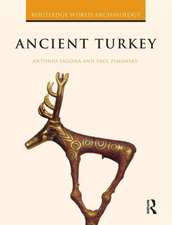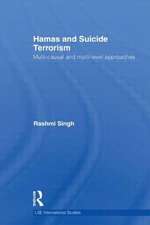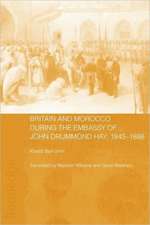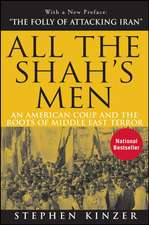The Arab State: Dilemmas of Late Formation: Routledge Studies in Middle Eastern Politics
Autor Adham Saoulien Limba Engleză Hardback – 15 dec 2011
Examining states as a ‘process’, the author argues that what emerged in the Middle East in the beginning of the twentieth century are ‘social fields’—where states form and deform—and not states as defined by Max Weber. He explores the constitutions of these fields—their cultural, material and political structures—and identifies three stages of state development in which different cases can be located. Capturing the dilemmas that ‘late-forming states’ face as regimes within them cope with domestic and international pressure, the author illustrates several Middle East cases and presents a detailed analysis of state developments in Saudi Arabia and Iraq.
He maintains that more than the domestic characteristics of individual states, state survival in the Middle East is also a function of the anarchic nature of the international (and by extension the regional) states-system.
The first to raise the question on the survivability of the territorial states in the Middle East while engaging with both International Relations and Comparative Politics theories, this book will be of interest to students and scholars of Middle East politics, Comparative Politics and International Relations.
| Toate formatele și edițiile | Preț | Express |
|---|---|---|
| Paperback (1) | 311.48 lei 6-8 săpt. | |
| Taylor & Francis – 10 mar 2014 | 311.48 lei 6-8 săpt. | |
| Hardback (1) | 1052.38 lei 6-8 săpt. | |
| Taylor & Francis – 15 dec 2011 | 1052.38 lei 6-8 săpt. |
Din seria Routledge Studies in Middle Eastern Politics
-
 Preț: 325.02 lei
Preț: 325.02 lei -
 Preț: 280.08 lei
Preț: 280.08 lei -
 Preț: 309.89 lei
Preț: 309.89 lei -
 Preț: 302.14 lei
Preț: 302.14 lei - 9%
 Preț: 1004.96 lei
Preț: 1004.96 lei - 18%
 Preț: 1065.06 lei
Preț: 1065.06 lei - 18%
 Preț: 1171.22 lei
Preț: 1171.22 lei - 16%
 Preț: 300.49 lei
Preț: 300.49 lei - 18%
 Preț: 1057.57 lei
Preț: 1057.57 lei - 14%
 Preț: 299.06 lei
Preț: 299.06 lei - 18%
 Preț: 1162.08 lei
Preț: 1162.08 lei - 28%
 Preț: 850.37 lei
Preț: 850.37 lei - 18%
 Preț: 1061.06 lei
Preț: 1061.06 lei - 18%
 Preț: 1057.05 lei
Preț: 1057.05 lei - 18%
 Preț: 1059.48 lei
Preț: 1059.48 lei - 18%
 Preț: 1166.49 lei
Preț: 1166.49 lei - 18%
 Preț: 1062.31 lei
Preț: 1062.31 lei - 25%
 Preț: 854.33 lei
Preț: 854.33 lei -
 Preț: 418.22 lei
Preț: 418.22 lei -
 Preț: 341.21 lei
Preț: 341.21 lei -
 Preț: 409.69 lei
Preț: 409.69 lei - 18%
 Preț: 1061.06 lei
Preț: 1061.06 lei - 18%
 Preț: 1056.00 lei
Preț: 1056.00 lei -
 Preț: 287.99 lei
Preț: 287.99 lei - 18%
 Preț: 1057.57 lei
Preț: 1057.57 lei - 18%
 Preț: 1001.87 lei
Preț: 1001.87 lei - 18%
 Preț: 1055.84 lei
Preț: 1055.84 lei - 18%
 Preț: 1057.89 lei
Preț: 1057.89 lei - 26%
 Preț: 822.36 lei
Preț: 822.36 lei - 18%
 Preț: 1057.26 lei
Preț: 1057.26 lei - 18%
 Preț: 1439.85 lei
Preț: 1439.85 lei - 18%
 Preț: 1164.92 lei
Preț: 1164.92 lei - 18%
 Preț: 1057.75 lei
Preț: 1057.75 lei - 26%
 Preț: 821.29 lei
Preț: 821.29 lei - 18%
 Preț: 1058.79 lei
Preț: 1058.79 lei - 18%
 Preț: 1057.75 lei
Preț: 1057.75 lei - 18%
 Preț: 1056.32 lei
Preț: 1056.32 lei - 18%
 Preț: 1055.69 lei
Preț: 1055.69 lei - 25%
 Preț: 824.70 lei
Preț: 824.70 lei - 18%
 Preț: 1060.25 lei
Preț: 1060.25 lei - 18%
 Preț: 1060.87 lei
Preț: 1060.87 lei - 18%
 Preț: 1071.30 lei
Preț: 1071.30 lei - 28%
 Preț: 820.03 lei
Preț: 820.03 lei - 18%
 Preț: 1056.35 lei
Preț: 1056.35 lei - 18%
 Preț: 1061.22 lei
Preț: 1061.22 lei
Preț: 1052.38 lei
Preț vechi: 1283.39 lei
-18% Nou
Puncte Express: 1579
Preț estimativ în valută:
201.40€ • 209.49$ • 166.27£
201.40€ • 209.49$ • 166.27£
Carte tipărită la comandă
Livrare economică 14-28 aprilie
Preluare comenzi: 021 569.72.76
Specificații
ISBN-13: 9780415602952
ISBN-10: 0415602955
Pagini: 176
Ilustrații: 6 b/w images and 6 line drawings
Dimensiuni: 156 x 234 x 15 mm
Greutate: 0.39 kg
Ediția:1
Editura: Taylor & Francis
Colecția Routledge
Seria Routledge Studies in Middle Eastern Politics
Locul publicării:Oxford, United Kingdom
ISBN-10: 0415602955
Pagini: 176
Ilustrații: 6 b/w images and 6 line drawings
Dimensiuni: 156 x 234 x 15 mm
Greutate: 0.39 kg
Ediția:1
Editura: Taylor & Francis
Colecția Routledge
Seria Routledge Studies in Middle Eastern Politics
Locul publicării:Oxford, United Kingdom
Public țintă
Postgraduate and UndergraduateCuprins
Prologue 1. States and Social Fields 2. Constructing the Middle East: International Anarchy, Indigenous Responses 3. The Late-forming State: Ontology, Dilemmas and Conditions of Survival 4. Saudi Arabia: The Survival of a Homogeneous State 5. Iraq: The Survival of a Divided State. Conclusion: Why do States Survive in the Middle East?
Notă biografică
Adham Saouli is Lecturer of International Relations and Middle East Politics at the University of St. Andrews. His main research interests are in state formation and behaviour in the Middle East.
Recenzii
Saouli is tackling questions that have perplexed political scientists since the advent of the discipline and utilizing Middle Eastern cases to illuminate these conceptual puzzles…The book has many merits. It bridges the divide between comparative politics and international relations to produce research that is broadly relevant to a number of scholarly audiences… its main contribution is to show how "state formation is not a unilinear process" (p. 12). Saouli’s positioning of states on a formation/de-formation continuum is particularly creative (p. 13).…The book will be of interest not only to those studying Arab politics, but also to scholars interested in state weakness, variation in state capacity, and state collapse.
Abdul-Wahab Kayyali,, Department of Political Science, George Washington University, Washington D.C
International Journal of Middle East Studies,(46) 2014
Abdul-Wahab Kayyali,, Department of Political Science, George Washington University, Washington D.C
International Journal of Middle East Studies,(46) 2014
Descriere
This book explores the conditions of state survival in the Middle East. Capturing the dilemmas that ‘late-forming states’ face as they cope with domestic and international pressure, it provides a model for study of the state in the Arab world and a theory to explain its survival.















